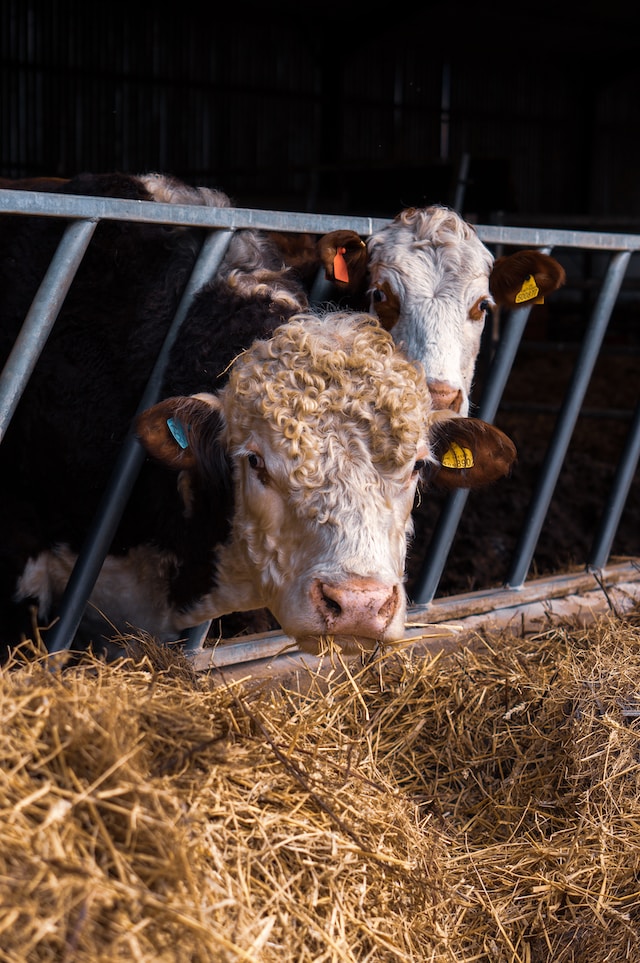10 Powerful Reasons to Transition to a Vegan Lifestyle
If you’re looking for a way to improve your health, help animals, and reduce your environmental impact, going vegan might be the perfect choice for you.
A vegan diet involves eliminating all animal products from your diet, including meat, dairy, eggs, and even honey. While it may seem like a daunting change, there are plenty of reasons to make the switch.
First and foremost, going vegan is one of the best ways to help animals. Every year, millions of animals are raised for food in inhumane conditions, and going vegan is a simple way to reduce this suffering.
In fact, every vegan saves around 200 animals per year. Additionally, a vegan diet is healthier for you.
Plant-based diets have been shown to reduce the risk of heart disease, diabetes, and certain types of cancer. Plus, they’re often lower in saturated fat and cholesterol, which can help you maintain a healthy weight.

The Health Benefits of a Vegan Diet
Switching to a vegan diet can provide numerous health benefits that can improve your overall well-being. Here are some of the most significant health benefits of a vegan diet:
1. Lower Risk of Chronic Diseases
Studies have shown that a vegan diet can lower the risk of chronic diseases such as heart disease, type 2 diabetes, and certain types of cancer. This is because plant-based foods are typically lower in saturated fat and higher in fiber, vitamins, and minerals.
2. Better Weight Management
If you’re looking to lose weight, a vegan diet can be an effective way to achieve your goals. Plant-based foods are generally lower in calories than animal-based foods, and they can help you feel full and satisfied for longer periods.
3. Improved Digestion
A vegan diet is rich in fiber, which can improve digestion and prevent constipation. Additionally, plant-based foods are typically easier to digest than animal-based foods, which can reduce inflammation and improve gut health.
4. Lower Blood Pressure
A vegan diet is naturally low in sodium, which can help lower blood pressure. This is important because high blood pressure is a major risk factor for heart disease and stroke.
5. Reduced Inflammation
A vegan diet is rich in anti-inflammatory compounds such as antioxidants, which can reduce inflammation throughout the body. This can help prevent and manage chronic diseases such as arthritis, asthma, and inflammatory bowel disease.
6. Better Kidney Function
Studies have shown that a vegan diet can improve kidney function and reduce the risk of kidney disease. This is because plant-based foods are typically lower in protein, which can reduce the workload on the kidneys.
7. Stronger Bones
Contrary to popular belief, a vegan diet can provide all the calcium and other nutrients needed for strong bones. In fact, a vegan diet may even be better for bone health than a diet that includes animal products.
8. Improved Mood
A vegan diet is rich in nutrients that can improve mood and mental health. For example, plant-based foods are high in omega-3 fatty acids, which can reduce symptoms of depression and anxiety.
9. Clearer Skin
A vegan diet can improve the appearance of your skin by reducing inflammation and providing essential nutrients such as vitamins A and C. Additionally, a vegan diet eliminates many of the foods that can contribute to acne and other skin problems.
10. Longer Life
Studies have shown that a vegan diet can increase lifespan and reduce the risk of premature death. This is because a vegan diet can lower the risk of chronic diseases and improve overall health and well-being.
In summary, a vegan diet can provide numerous health benefits that can improve your overall quality of life. By making the switch to a plant-based diet, you can lower your risk of chronic diseases, improve digestion, reduce inflammation, and much more.

Environmental Impact of Going Vegan
Going vegan has a significant positive impact on the environment. If you’re still on the fence about transitioning to a plant-based diet, consider these environmental benefits:
Reduced Greenhouse Gas Emissions
Animal agriculture is one of the leading contributors to greenhouse gas emissions. According to the US Environmental Protection Agency’s equivalencies calculator, a vegan diet can reduce carbon emissions by up to 1.5 tons per year. This is equivalent to driving 3,000 miles less per year or switching to a hybrid car.
Reduced Water Usage
Animal agriculture is also a major consumer of water. According to the Water Footprint Network, producing one pound of beef requires 1,799 gallons of water, while producing one pound of tofu requires only 244 gallons. Going vegan can help reduce water usage and conserve this precious resource.
Reduced Land Use
Animal agriculture also requires a significant amount of land. A study published in the journal Science found that if everyone in the US went vegan, the country would be able to reduce its land use by 75%. This could help reduce deforestation, preserve biodiversity, and protect natural habitats.
Reduced Pollution
Animal agriculture is a major source of water and air pollution. The waste produced by factory farms can contaminate nearby water sources, while the gases produced by animal digestion can contribute to air pollution. Going vegan can help reduce these harmful pollutants and improve the quality of our air and water.
Reduced Species Extinction
Animal agriculture is a leading cause of species extinction. By reducing demand for animal products, we can help reduce the pressure on natural habitats and protect endangered species.

Improving Animal Welfare
Going vegan is one of the most effective ways to improve animal welfare. By choosing a plant-based diet, you are reducing the demand for animal products, which means fewer animals will be bred and raised for consumption.
This, in turn, reduces the number of animals subjected to cruel and inhumane treatment in factory farms and slaughterhouses.
Animal agriculture is one of the leading causes of animal suffering. In factory farms, animals are often confined to small, cramped spaces where they are unable to move freely or engage in natural behaviors.
They are subjected to routine mutilations, such as beak trimming, tail docking, and castration, without any pain relief. They are also fed a diet that is often unnatural and unhealthy, which can lead to a host of health problems.
In addition to the suffering caused by factory farming, animals raised for food are also subjected to long and stressful transport to slaughterhouses. Once there, they may be handled roughly and slaughtered in ways that are painful and terrifying.
By going vegan, you can help reduce the demand for animal products and improve animal welfare. You’ll also be supporting a more sustainable food system that is better for the environment, as well as your own health.

Boosting Nutrient Intake
One of the most common misconceptions about a vegan diet is that it lacks essential nutrients.
However, this couldn’t be further from the truth. In fact, a well-planned vegan diet can provide you with all the nutrients your body needs to thrive.
Going vegan means that you’ll be consuming more fruits, vegetables, whole grains, nuts, and seeds. These foods are packed with essential vitamins, minerals, and antioxidants that your body needs to function properly.
For example, leafy greens like spinach and kale are rich in iron, while beans and lentils are great sources of protein and fiber.
Moreover, a vegan diet can help you avoid harmful substances that are often found in animal products.
For instance, animal products are often high in saturated fat, which can increase your risk of heart disease and other chronic conditions. By contrast, plant-based foods are low in saturated fat and high in healthy fats like Omega-3.
In addition, vegan diets tend to be higher in fiber than non-vegan diets. Fiber is important for maintaining a healthy digestive system and can help prevent constipation, diverticulitis, and other digestive disorders.

Weight Management Benefits
One of the most significant reasons people choose to go vegan is for weight management. A plant-based diet can naturally lead to weight loss or weight maintenance due to its emphasis on whole, nutrient-dense foods.
Fruits, vegetables, whole grains, and legumes tend to be lower in calories and higher in fiber compared to animal-based foods.
When you switch to a vegan diet, you will likely notice that you feel fuller for longer periods of time, which can help you avoid overeating.
Additionally, plant-based foods are often less calorie-dense than animal-based foods. For example, a cup of cooked lentils contains about 230 calories, while a 4-ounce serving of beef contains around 250 calories.
Furthermore, a vegan diet can help you lose weight without counting calories or restricting portions. You can eat until you’re satisfied without worrying about calorie intake.
This can be especially helpful for people who have struggled with yo-yo dieting or disordered eating patterns in the past.
In addition to weight loss, a vegan diet can also help you maintain a healthy weight over the long term.
Studies have shown that people who follow a plant-based diet have a lower body mass index (BMI) than those who consume meat and dairy products.
Overall, if you’re looking for a sustainable way to manage your weight, going vegan may be a great option for you. By focusing on whole, plant-based foods, you can nourish your body while naturally controlling your calorie intake.

Reducing Risk of Chronic Diseases
Going vegan can help reduce the risk of chronic diseases. Here are three chronic diseases that a vegan diet can help prevent:
Heart Disease
Heart disease is a leading cause of death worldwide. A vegan diet can help reduce the risk of heart disease by lowering blood pressure, reducing cholesterol levels, and improving overall heart health.
Plant-based foods such as fruits, vegetables, whole grains, nuts, and seeds are rich in nutrients that can promote heart health.
Diabetes
Diabetes is a chronic disease that affects how your body processes blood sugar. A vegan diet can help prevent and manage diabetes by improving insulin sensitivity and reducing blood sugar levels.
Plant-based foods are generally low in calories and high in fiber, which can help regulate blood sugar levels, making it easier for the body to manage diabetes.
Cancer
Cancer is a disease characterized by the uncontrolled growth of abnormal cells in the body. Research has shown that a vegan diet can reduce the risk of certain types of cancer, such as colon and breast cancer.
This is because a plant-based diet is rich in nutrients and antioxidants that help protect cells against damage and inflammation. It also eliminates processed meats, which have been linked to an increased risk of cancer.

Impact on Global Food Supply
Switching to a vegan diet can have a significant impact on the global food supply. Animal agriculture requires large amounts of land, water, and feed to produce meat and dairy products. This puts a strain on resources and contributes to deforestation, water scarcity, and pollution.
According to the World Wildlife Fund, animal agriculture is one of the leading causes of deforestation, water pollution, and biodiversity loss.
By choosing plant-based foods, we can reduce the demand for animal products and free up resources for other uses. This can help promote a more sustainable food system that can support the growing population.
Furthermore, a vegan diet can help to address food inequality by using resources more efficiently.
According to a study published in the journal Nature, a vegan diet could feed 10 billion people in 2050, compared to a vegetarian diet that could feed 9.2 billion people and a meat-based diet that could only feed 7.3 billion people. This is because a vegan diet requires fewer resources, such as land, water, and energy, to produce the same amount of food.
In addition, a vegan diet can help to reduce food waste. Animal products are often wasted due to spoilage and overproduction, whereas plant-based foods have a longer shelf life and can be grown more efficiently.

Veganism and Longevity
Going vegan can have a significant impact on your health and longevity. According to a study published in the Journal of the American Heart Association, following a plant-based diet can reduce the risk of heart disease by up to 32%.
In addition to reducing the risk of heart disease, a vegan diet can also help you maintain a healthy weight, which is important for overall health and longevity.
Plant-based foods are generally lower in calories and higher in fiber, which can help you feel full and satisfied while consuming fewer calories.
Furthermore, a vegan diet has been shown to improve gut health by increasing the diversity of gut bacteria. This can lead to a stronger immune system and reduced risk of chronic diseases such as diabetes, cancer, and Alzheimer’s.
It’s important to note that simply going vegan doesn’t guarantee good health and longevity. It’s still important to eat a balanced diet that includes a variety of fruits, vegetables, whole grains, legumes, nuts, and seeds.
It’s also recommended to supplement with vitamin B12, which is not naturally found in plant-based foods.
In summary, going vegan can have many health benefits, including a reduced risk of heart disease, healthy weight maintenance, improved gut health, and reduced risk of chronic diseases.

Personal Growth and Self-Discovery
Going vegan is not just about the food you eat, but it can also be a journey of personal growth and self-discovery. Here are some ways in which going vegan can help you grow as a person:
1. Trying New Foods
When you go vegan, you will be exposed to a whole new world of foods that you may not have tried before. This can be an exciting and fun adventure as you explore new flavors and ingredients. You may discover new favorite foods that you never would have tried otherwise.
2. Developing Cooking Skills
Cooking plant-based meals can be a fun and rewarding experience. You may find yourself experimenting with new recipes and techniques, which can help you develop your cooking skills. You may also discover that you have a passion for cooking that you never knew existed.
3. Learning About Nutrition
Going vegan requires you to be more mindful of your nutritional needs. You may find yourself reading labels and researching the nutritional content of different foods. This can help you develop a better understanding of nutrition and how it affects your body.
4. Developing Empathy
By choosing to live a vegan lifestyle, you are showing empathy towards animals and their welfare. This can help you develop empathy towards other people and their struggles. You may find yourself becoming more compassionate and understanding towards others.
5. Building Community
Going vegan can help you connect with like-minded individuals who share your values. You may find yourself joining vegan groups or attending vegan events, which can help you build a sense of community and belonging.
6. Challenging Your Beliefs
Going vegan can challenge your beliefs about food, animals, and the environment. This can be a valuable opportunity to reevaluate your values and beliefs and make changes that align more closely with your morals and ethics.
7. Increased Self-Control
Choosing to live a vegan lifestyle requires self-control and discipline. You may find yourself becoming more disciplined in other areas of your life as well, such as exercise or work.
8. Improved Mental Health
Research has shown that a plant-based diet can have positive effects on mental health. Going vegan may help reduce symptoms of anxiety and depression, and improve overall well-being.
9. Reduced Environmental Impact
Living a vegan lifestyle can help reduce your environmental impact and contribute to a more sustainable future. This can be a source of pride and motivation to continue making positive changes in your life.
10. Increased Sense of Purpose
By choosing to live a vegan lifestyle, you are making a positive impact on the world. This can give you a sense of purpose and fulfillment, knowing that you are making a difference in the lives of animals, the environment, and your own health.

Conclusion
Going vegan is a great way to improve your health, protect animals, and help the environment. You don’t have to make the switch overnight, but incorporating more plant-based meals into your diet can have significant benefits.
With the availability of delicious vegan alternatives and the growing awareness of the impact of our food choices, it’s becoming easier than ever to make a positive change for yourself and the world.
So why not give veganism a try? Whether you’re looking to improve your health, protect animals, or help the environment, going vegan is a simple and effective way to make a positive impact.

